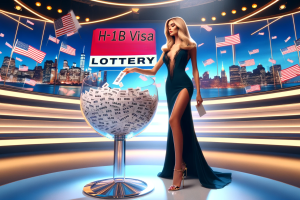Support migrant centric journalism today and donate

By Sanwar Ali:
The H-1B visa is an essential part of the American immigration system, enabling US employers to employ foreign professionals to work in specialized occupations within the United States. Recently, the U.S. Citizenship and Immigration Services (USCIS) conducted a second lottery for the fiscal year 2024 H-1B cap, that has implications for prospective applicants and employers alike. This article delves into the reasons behind the second lottery, its effects, and how it fits into the broader context of U.S. immigration rules.
Understanding the H-1B Visa
The H-1B visa is a non-immigrant work visa that allows U.S. companies to employ foreign nationals in specialty occupations. These occupations typically require a high level of technical expertise and are often found in sectors such as technology, engineering, and medicine. The visa is particularly popular among technology companies, which use it to hire thousands of skilled professionals from countries like India and China each year.
The H-1B visa is subject to an annual cap, with a certain number of visas allocated for the regular cap and an additional amount set aside for those with advanced degrees from U.S. institutions. The quota is 85,000 visas a year. With demand for these visas often exceeding supply, USCIS uses a lottery system to determine which registrations will be selected. There are a limited number of employers who are not subject to the quota; These are universities and related nonprofit entities, nonprofit research organizations and government research organizations.
The Second H-1B Lottery: An Overview
In a typical year, USCIS conducts a single lottery to select H-1B registrations. However, for the fiscal year 2024, USCIS conducted an initial lottery and then, in an unusual move, decided to conduct a second lottery. There were so many fraudulent applications that ended up being disqualified that a second lottery was needed to allocate disqualified applications.
The second lottery was drawn from previously submitted electronic registrations. Once the selections were made, USCIS updated the myUSCIS accounts of successful registrants, giving them the opportunity to file an H-1B cap-subject petition for the beneficiaries named in the selected registration.
The Reasons Behind the Second Lottery
So, why did USCIS decide to conduct a second lottery this year? The answer lies in the large number of fraudulent registrations received during the first round. USCIS found that some parties were attempting to gain an unfair advantage by submitting multiple registrations for the same beneficiary.
The second lottery is to allocate the fraudulent applications to other H1B applicants.
The Impact of the Second Lottery
The second lottery has implications for both prospective H-1B visa applicants and their employers. For applicants, it provides a second chance to get selected for the H-1B cap. For employers, especially those in the technology sector, it may enable them to address labor shortages in certain specialty occupations.
However, the second lottery also underscores the high demand for H-1B visas and the challenges associated with securing one. This has led to calls for reforming the H-1B visa program, with proposals ranging from increasing the annual cap to changing the selection process.
The H1B Visa in the Broader Immigration Context
The H-1B visa is just one part of the U.S. immigration system, which includes various other visas such as the B1 and B2 visitor visas, the L1 visa for intracompany transferees, the E1 and E2 visas for treaty traders and investors, and the O1 visa for individuals with extraordinary ability or achievement.
There's also the F1 student visa, which allows foreign students to study in the U.S., and the Optional Practical Training (OPT) program, which permits F1 students to work in their field of study for up to 12 months (or up to 36 months for those in STEM fields).
Furthermore, the U.S. also has various immigrant visas, like the employment-based green card, which provides permanent residency and the opportunity to eventually apply for U.S. citizenship. Each of these visas has its own requirements, processes, and quotas, adding to the complexity of the immigration system.
Looking Ahead: USCIS' Plans for the H-1B Visa
USCIS has signaled that it is working on an "upcoming H-1B modernization rule" aimed at improving the H-1B registration process. The aim is to reduce the potential for misuse and fraud in the registration system, to try and ensure a fair and equitable process for all.
While the specifics of this rule are yet to be revealed, it is clear that USCIS is taking steps to address the challenges associated with the H-1B visa. This is good news for prospective applicants and their employers, as well as for the U.S. economy, which relies on the skills and expertise of foreign professionals.
Getting Help with Your H-1B Visa Application
If you're considering applying for an H-1B visa, or any other U.S. work visa, it's important to get professional help. Workpermit.com is a specialist visa services firm with over thirty years of experience dealing with visa applications. They can help guide you through the process, providing you with the advice and support you need to navigate the complex U.S. immigration system.
Conclusion
Overall, the second H-1B lottery for the fiscal year 2024 is a significant development in the U.S. immigration landscape. While it offers a second chance for some, it also highlights the high demand for these visas and the need for reforms. As USCIS continues to refine the H-1B visa program, it's important for prospective applicants and their employers to stay informed.
workpermit.com helps with US Work Visa: L1, H1B, E2, and O1 Visas
There are various types of US visas that individuals can apply for, depending on their circumstances. Some of the most common employment-based visas include:
L1 visa: This visa is for intracompany transferees who work in managerial or executive positions or have specialized knowledge.
H1B visa: This visa is for specialty occupations that require theoretical or technical expertise in specialized fields.
E2 visa: This visa is for investors who have made a significant investment in a US business and, management or essential skills employees. Only certain nationalities can apply.
O1 visa: This visa is for individuals with extraordinary abilities in the arts, sciences, education, business, or athletics.
Workpermit.com is a specialist visa services firm with over thirty years of experience dealing with visa applications. For more information and advice, please contact us on 0344 991 9222 or at london@workpermit.com(link sends e-mail)





















